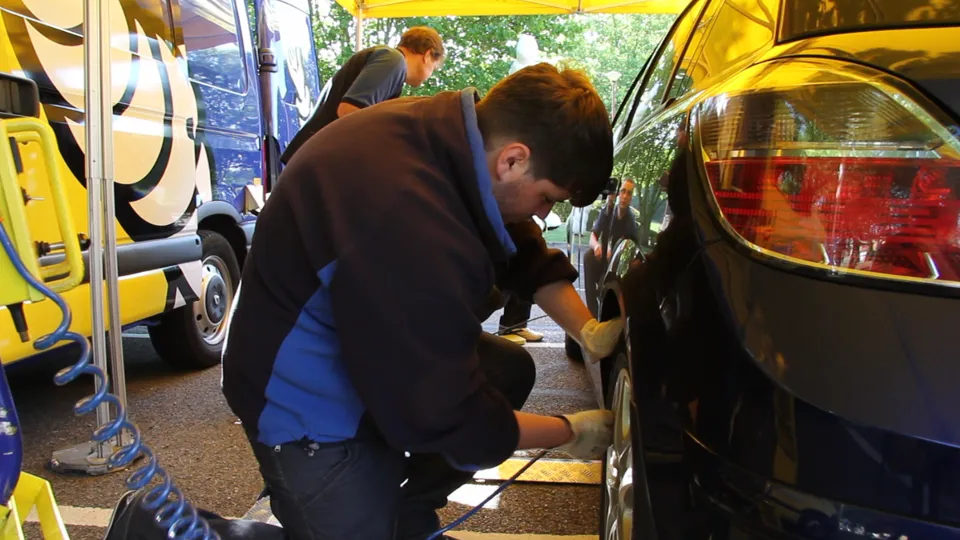Anglian Water could save almost £65,000 in fuel costs each year, while reducing its carbon emissions by 117 tonnes, simply by adjusting tyre pressures across its fleet.
The savings were identified by Michelin after checking the tyre pressures of 196 Anglian Water vehicles at two recent ‘Fill up with Air’ events organised by the tyre manufacturer.
Around 40% of the vehicles tested had low tyre pressures against a national average of 38%.
Tyre performance can be seriously affected by low tyre pressures. For example, 7psi under-inflation leads to around 2% more fuel consumption and a 2% increase in C02 emissions. Tyres under inflated by 15psi (1bar) have increased rolling resistance leading to around 6% greater fuel consumption.
By ensuring tyres have the correct pressures, individual drivers can improve safety, reduce C02 emissions and reduce fuel usage and tread wear. For a fleet this can mean substantial savings.
As a result, Anglian Water will be providing information to all employees that will highlight the benefits of correcting tyre pressures in terms of safety, reducing fuel usage, CO2 emissions and financial savings.
Michelin is also providing wheel arch stickers showing the correct tyre pressures for Anglian Water vans. Correct tyre pressures for cars will be published on their intranet site.
In addition, Anglian Water’s recommended vehicle checks now include a weekly tyre pressure check as well as the usual visual daily inspection, while employees will be reminded of the benefits of good tyre care on a regular basis. Any tyres not meeting company standards will be reported to the driver’s manager and highlighted as a near miss.
David Riley, carbon manager, Anglian Water, said: “There is a strong link between tyre pressure, how safely we can drive and how much diesel we are using for each journey we make.”
When driving with insufficient pressure, the tyre undergoes greater flexing leading to an increase in tyre temperature which can lead to permanent deterioration of the tyre’s structure.
Over-inflation leads to a smaller contact patch, which deteriorates handling, increases susceptibility to shock and impact damage and increases tyre wear leading to reduced mileage.
Transport accounts for 6% of Anglian Water’s carbon emissions and the company is looking to reduce overall carbon emissions by 10% in real terms by 2015.
Staff are also striving to have no accidents and no incidents as part of their ‘Love Every Drop’ campaign.
Anglian Water believes its drivers can help contribute to these goals by looking after their tyres properly, while Michelin supported by ATS Euromaster are supporting them in these aims.
Riley explains that Anglian Water challenged all of its suppliers to help it reduce its overall carbon emissions.
He continued: “Simple steps such as checking tyre pressures can help in everyone playing their part in terms of reducing overall carbon emissions.
“This is a very simple process for other organisations to learn from.”
Peter Wood, Michelin key account manager, told Fleet News that the Fill up with Air events were crucial to educating drivers about the importance of checking tyre pressures.
“Tyres need to be at the right pressure for three main reasons – safety, longevity and fuel consumption,” explained Wood.
“In terms of safety, if tyre pressures are not correct grip levels can be reduced, braking distances extended and the vehicle will not handle as well.
“In the worst case there is a risk of a rapid tyre deflation with very serious consequences.
“It also takes more effort to move a car along that has under-inflated tyres so you will use more fuel. If you can correct your tyre pressures you will use less fuel and also emit less C02 into the atmosphere.”
Michelin’s results reveal that for an organisation with a large fleet such as Anglian Water, it can make a significant difference to its carbon emissions by making sure tyre pressures are maintained correctly.
Drivers can also contribute to reducing operating costs by driving smoothly and anticipating road conditions which can reduce tread wear and the need for new tyres, as well as using less fuel – potentially saving several tens of thousands of pounds.
Wood concluded: “Anglian Water is leading the way in how they are tackling their carbon reduction, but more and more companies are realising that monitoring tyre pressures is actually a quick win and very inexpensive as well.
“Tyres are a really important component on your vehicle. If you look after them, they will look after you.”




















Login to comment
Comments
No comments have been made yet.